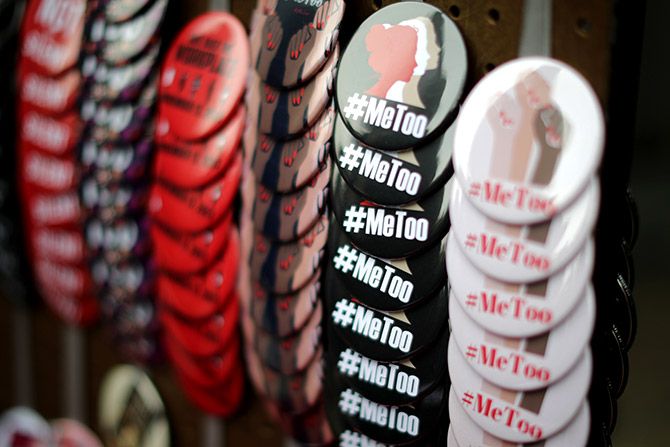Heard of India's sexual harassment complaint box?
Kanika Datta examines the pros and cons of the online system.

When will India's Harvey Weinsteins be exposed?
Photograph: Lucy Nicholson/Reuters.
Harvey Weinstein's serial sexual transgressions -- and the legions of star offenders (including politicians) who hit the spotlight thereafter -- make you wonder. If this is what goes on in a supposedly enlightened society like the United States, where women have a demonstrably stronger voice, what's happening in India?
Much worse, you would imagine, given Indian society's entrenched misogyny (as reflected in our national statistics).
Note, however, that no comparable exposes have emerged from Bollywood -- though a sting operation a few years ago confirmed that the casting couch remains a la mode.
As for the workplace, where reporting structures make complaints a hazardous exercise for the victim, Indian women can only view with envy the sophisticated complaint mechanisms in developed economies.
So Minister of Women and Child Development Maneka Sanjay Gandhi's decision to launch the SHe-Box online complaint management system for women working in both government and private companies is, prima facie at least, sensible and enlightened (the capitalised SH stands for sexual harassment in case you missed the point).
At last, working women in India will have recourse to some kind of institutionalised redress, especially when surveys have shown that most companies bypass the statutory requirement for a sexual harassment complaints committee.
It is interesting that the ministry website permits women who have filed their complaints with internal or local complaints committees to file on this site as well.
Ms Gandhi's initiative is part of a wider exercise, the press release informs us, to 'provide a safe and fair environment' for working women.
SHe-Box, we are informed, has been launched to provide platform to aggrieved women to make their complaints directly so that suitable action is taken to redress their grievances.
The ministry will monitor the complaints and 'provide speedier remedy' (sic).
No one doubts the sincerity behind the SHe-Box initiative, inspired by the viral #metoo campaign, but here are several questions and red flags about the exercise.
First up is the limited scope of the exercise.
Why is the site restricted to public and private corporations?
The 'workplace' is a pretty stretchable place by definition and so should government and quasi-government institutions not be included as well?
What about universities, and sundry educational institutions?
What redress does this offer professions like actors or maids and those in similar 'unorganised' or non-institutionalised trades -- which manifestly employs legions of women?
Second, how precisely will the ministry ensure 'speedier remedy' for victims?
The press release does not specify but let us assume it takes the form of stern letters from the ministry to the corporation concerned. In the absence of any legally punitive measures it is hard to see how a letter of admonition can spur recalcitrant HR departments to action.
Third -- and perhaps most critical in an exercise of this nature -- what level of confidentiality does this site offer?
The system of registering is fairly simple, and it allows you to monitor the status of your complaint. But as we know only too well, data can be easily hacked; 'humint' leaks are no less simple.
A standard disclaimer absolves the government from liability 'for expense, loss or damage, including without limitation, indirect or consequential loss or damage, or any expense, loss or damage whatsoever arising from use, or loss of use, of data, arising out of or in connection with the use of this portal'.
In other words, if someone -- a rogue employee, say -- chooses to put out in the public domain details of the complaints, no redress is available to either the complainant or the person against whom the complaint has been registered.
Now, the practice of naming and shaming may have a cathartic effect for the victim no doubt, but a system that lacks confidentiality and due process could well encourage the filing of false accusations by those who simply have a grudge against their boss.
The case of the University of California student who posted a crowdsourced list of male academics who have allegedly harassed or sexually assaulted students highlights the dangers of unmonitored naming and shaming campaigns.
The list that was circulated by a student is entirely unverified, often leaves out the name of the accuser and contains no response from the academics concerned. At least one professor had understandably asked for details of an accusation against his name -- to no avail.
This sort of thing detracts from the veracity and legitimacy of initiatives like SHe-Box and the real crisis it seeks to address. If SHe-Box is not to degenerate into an exercise in futility, Ms Gandhi's ministry may need to seriously address these issues too.












 © 2025
© 2025